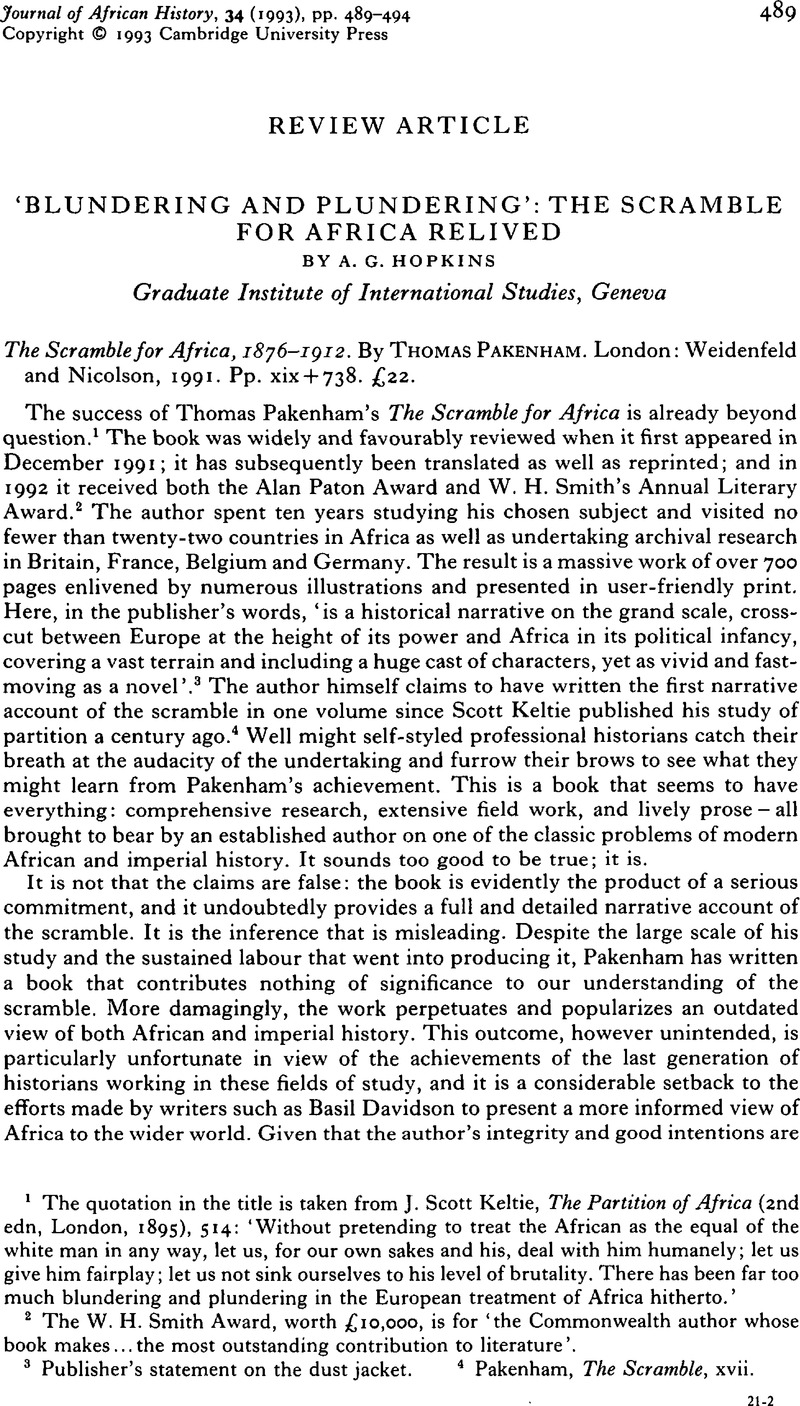Published online by Cambridge University Press: 22 January 2009

1 The quotation in the title is taken from Keltie, J. Scott, The Partition of Africa (2nd edn, London, 1895), 514Google Scholar: ‘Without pretending to treat the African as the equal of the white man in any way, let us, for our own sakes and his, deal with him humanely; let us give him fairplay; let us not sink ourselves to his level of brutality. There has been far too much blundering and plundering in the European treatment of Africa hitherto.’
2 The W. H. Smith Award, worth £10,000, is for ‘the Commonwealth author whose book makes…the most outstanding contribution to literature’.
3 Publisher's statement on the dust jacket.
4 Pakenham, , The Scramble, xvii.Google Scholar
5 Thomas Pakenham is the son of Lord Longford, the Labour peer. The family's left-liberal leanings are well known and long established.
6 Nations readily acquire personalities, which then explain their actions: ‘France, jealous of Britain's pretensions, had her eye on a new African empire…’ Pakenham, , Scramble, 71.Google Scholar See also, III, 158.
7 Pakenham, , Scramble, 200.Google Scholar
8 Ibid. 79.
9 Ibid. 203–5, for example on the Bismarckian system.
10 Robinson, Ronald and Gallagher, John with Denny, Alice, Africa and the Victorians: The Official Mind of Imperialism (London, 1961; 2nd edn 1981).Google Scholar
11 Pakenham, , Scramble, III.Google Scholar
12 Ibid.
13 Henty was a widely-read and much-travelled war correspondent who knew many of the great figures of the day (such as Wolsely and Stanley) personally. See Arnold, Guy, Held Fast for England: G. A. Henty, Imperialist Boys' Writer (London, 1980).Google Scholar
14 Pakenham, , Scramble, 298, 352.Google Scholar
15 Ibid. 439. By unfortunate coincidence, this is reminiscent of a technique frequently used by Henty, who often condemned the general run of ‘native peoples’ while allowing individual exceptions whose presence offered hope for the ultimate success of the civilizing mission and, meanwhile, justified foreign domination.
16 Ibid., for example, 447, 463.
17 Ibid. 414–15.
18 Ibid. 192–3.
19 Ibid. 463.
20 There are only about half a dozen references to modern academic journals, for example, and only one of these is to the Journal of African History.
21 For a development of the last point see Ian Phimister's valuable review essay, ‘Unscrambling the scramble for Southern Africa’, Journal of Southern African Studies (forthcoming). Pakenham's account relies heavily on his previous, highly successful book, The Boer War (London, 1979)Google Scholar, an equally large and detailed narrative which laid heavy emphasis on particular personalities, above all Milner. This study was also greeted with acclaim when it appeared, but it has had little influence on the development of the subject in the decade or so since it was published.
22 Pakenham, The Boer War.
23 The full reference is given in n. 11.
24 This problem is not confined to Britain, of course, but it may have features (derived partly from the elitist structure of higher education) that are found less prominently in continental Europe, for example, where there are identifiable groups of ‘intellectuals’ and associated interpreters linking academics and the general public, and where, at least in some of the smaller countries, scholars themselves seem to be more ready to accept the idea that it is part of their function to translate (sometimes literally) important ideas and make them more widely known, whether in summary publications of their own or in the serious press.
25 It is encouraging to see that the President of the African Studies Association (U.K.) has noted the existence of the problem in his recent presidential address: McCracken, John, ‘African history in British universities: past, present and future’, African Affairs, XCII (1993). 251–2.Google Scholar